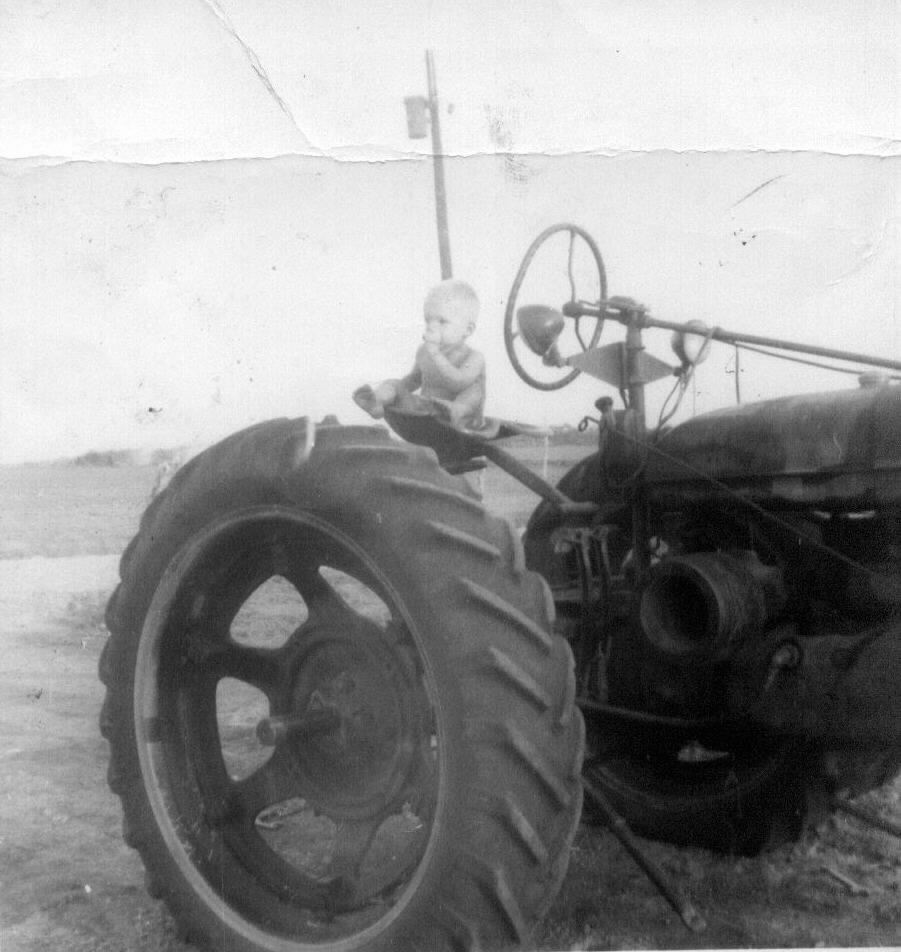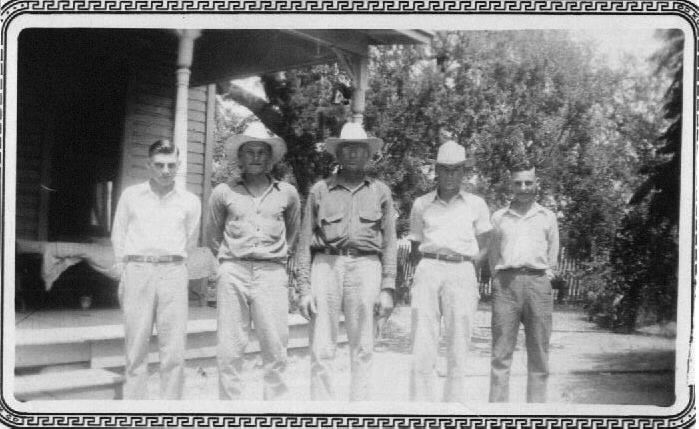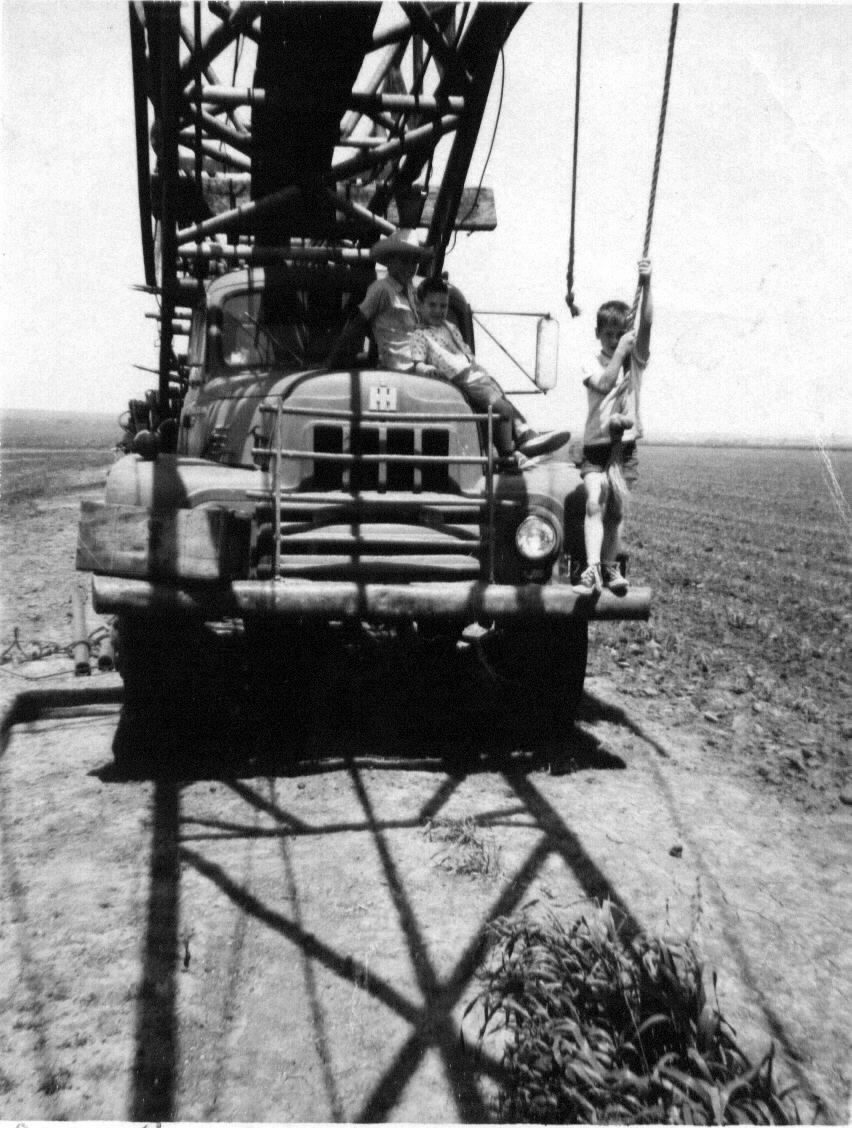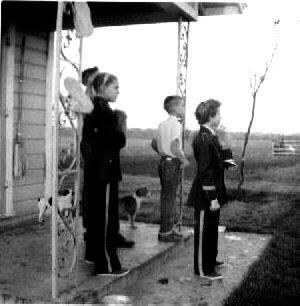Alvin Santleben Sr.
andCarmen C. Santleben


William Christian Santleben resided one mile south of his father, Christian JR's homestead, where he lived in a small room built on to the side of his barn. He later married Frieda Webber who had a farm joining the property he had purchased just north of the Medina River at La Coste. After they married William built a home fifty yards east of the barn where he and Frieda raised six daughters and four sons: Ella, Laura, Clara, Inez who died at six years of age of diptheria, Josephine, William H. Jr. (Bill), Alvin, and the twins Floyd and Lloyd.


What was the wedding like?
(Granny)We married at Castroville, I was born and raised at Castroville, and we were married
there at the church rectory.
The Lutheran Church?
(Granny)No, in the Catholic church, the rectory.
(Grandpa)They wouldn't let you marry in the Catholic church, see I was a non-Catholic.
You had to marry in the rectory, you weren't good enough.
(Granny)And then mother and the relatives got together and they made Bar-B-Q and they made all
the potato
salad and the beans and everything and we served a meal later that evening out on the yard.
At Castroville
at the old two story house.
When you stayed with them (Grandpa and his dad and
brothers) you had to cook for everybody?
(Granny) Ya, Alvin's brothers lived there, first it was grandpa Santleben, this grandpa
and Floyd were down there. Then Lloyd came too when they
sold the ranch at Comfort then he lived down here too.
What happened to your mom? (to Grandpa)
(Grandpa) She passed away when she was 56 years old. She was in the Santa Rosa Hospital in
San Antonio and had her Gall bladder removed. After a few days she was released and returned
home
and she ate dinner and she had acute indigestion.
(Granny) She died right there at the house.
(Grandpa)But I think it was a blood clot from the operation, because
she died suddenly like a heart attack.
(Granny) Well a lot of time when you have your Gall bladder removed
you know you get indigestion from the food you eat, and they had just eaten dinner and
then she got sick and died.
She was a real hard working woman. She had ten children.
What did your dad do?(Grandpa)
(Grandpa) He was a farmer and rancher, he had a lot of cattle, farmed a lot of acreage,
hell he farmed all this that was Floyd's and this of mine, he farmed
about 400 to 450 acres because he farmed that above the highway too, then he had a ranch lease
that was 2,200 acres yet.
He had two places he bought and the housing development above Highway90 was his too.
At what time did y'all have mule and that to do the farm work?
(Grandpa)My dad did, I worked with them when I was young and worked for him.
(Granny) They had small tractors and just two rows at a time.
(Grandpa)They mules first, I remember I was seeding oats and they had run off with a brand
new seeder and they ran
from up here all the way home and bent the shit out of it.
 What year did y'all drill this Irrigation well?
What year did y'all drill this Irrigation well?
(Granny)In about 1965, because Carl and Jorge played in the irrigation water they came in
so full of mud, I made them
undress out on the back porch and threw them in the bathtub. Washed them off with a hose.
(Grandpa)It was drilled in 1965, so we farmed dry how many years, oh shit.
I know seven because it was seven year drought.
(Granny)Ya, well that was during the 50s
that we had that bad drought. For seven years we didn't make any crops.
Grandpa went to work at Mangold Feed & Seed, the Tire Company the test fleet, a driver for the
test fleet. He would work one at night and one in the day.
(Grandpa) I farmed, drove on the test fleet and worked at Mangold Feed & Seed, and Ranching,
I had four jobs. It was tough.
Grandpa, do you know what year you bought the farm?
We married in 47, we bought it after we were married, we must have bought it in 49 or 50.
I started farming at 16 years old. He was at the ranch most
of the time, Bill and I farmed it. Then dad would come in on weekends, he was down below
DeHanis about 16 miles. He had 2,200 acres down there 350 breed cows sometimes 400.
We taken care of his place.
What other jobs did you have
I worked with the test fleet for two years at least. Then I hammered nails, we did
everything from digging the ditches to putting the shingles on the roof.
And then we wanted a pay raise, we wanted a ten cent an hour pay raise and the boss said,
"Well I'll get somebody to dig these ditches." And we were cold digging
these ditches and here come five or six of these Mexicans and N-----s, and said,
"Where are we supposed to go to work?" and Chico Hitzfelder said, "Right here
pitch in." "Not for us," they said and walked off. We were digging trenches and after that
the boss gave us a ten cent raise. They wouldn't do the work. Then I worked down here on the
gravel crusher when they were rebuilding Highway 90, there I made quite a bit of money, I was
making $86 dollars a week, that was a lot of money then. Then in 1961 I run for Constable
I got $50 dollars a month and had to furnish my own car. And I had to work this whole damn
area, me and Mr. Hoog, and then the Sheriff and his chief deputy.
(Granny)And he still farmed and he
still ranched He's never had one job in his life, he's always had two or three.
How did you get extra money?
I was paid $50 a month to watch the Oil Refinery.
Then I guarded the Union Pacific Railroad at night when they had rail strikes. I made as high as
$80 working a day and night shift.
(Granny) You know when they would have the trains parked on the tracks
(Grandpa)
Then I would pick up W------s, the Federal Government would give us ten dollars a head,
that was when I was Constable. I picked up nine one night, made ninety bucks. And then they
went down to
eight dollars and then five and then two dollars, then they finally gave you two boxes of
ammunition at a time per wet-back. And then I got $25 dollars for picking up AWOLs, but I had
to take them to Lackland.
Grandpa how did you know they were w------s or AWOLs?
I would question them, and by their actions. They would act funny, then I would question them
and they told me. I arrested them by my instinct.

Granny you rode with him?
I used to ride with him at night, not all the time, on weekends when he worked. I had kids at
home.
And Granny you went to Nursing School?
I went about a year and a half and then we got married and I quit. It was at Sana Rosa
School of Nursing. That's about it, what do you do when you get married? You work and work
at keeping house and taking
care of kids. Then I started teaching I was a substitute teacher for 22 years at Medina
Valley School District.
Y'all went to school didn't y'all?
(Grandpa)We had
to walk to school and then back
home. Then when you got home you changed clothes and you ate lunch and you went and hoed in
the field, you didn't have any weed spray, you hoed them damn rows. And then you gathered the
corn by hand and then
threw it on the wagon and unloaded it in the barn. Then you backed the Sheller up there in the
wintertime and shelled it and shoveled it back in there. It was tough. Farming in the old days
was hard work.
What about when you were in law enforcement?
I went to work for the Sheriff's department because I could make more money. I was Constable
12 years, but I helped the Sheriff all the time.
They furnished me a car and paid me more money, I went to work for him because I helped him
anyway. Charles (Charlie) Hitzfelder was the Sheriff at the time, he was a good Sheriff, one
of the best that ever
hit the county. He had FBI training, and we got the same training. He would see that we got
training twice a year, he was good. Then I became his chief deputy for I guess twelve years
I don't know. Then the other
Sheriff got in and I became his Chief Deputy. Then I became Sheriff and then I retired.
(Granny)He worked for the county for over thirty years.
(Grandpa)I treated everybody equal that way you could go to bed and
sleep at night.
(Granny)They always laughed, they said he's tough, but he's fair. They took it because he was
tough with everybody.
(Grandpa)Don't take a penny, that way if somebody accuses you of taking it
you can look them in the eye and call them a damn liar.
In 1845 when the Charles William broke to pieces
one half mile from shore Christian Santleben Sr. showed his strength and endurance when he
brought all his family ashore.
He succeeded with nothing more than the clothes on his back and a small amount of money he
carried from the ship. He endured the long, never ending days and made a decent living for
his family.
Christian Jr. followed his fathers' footsteps in farming and ranching. He moved a quarter of
a mile south of his father and bought the land. He was an astounding man who took nothing for
granted and taught his boys well.
August Santleben didn't follow his father Christian Jr. in farming but did help him. He wrote
a book A Texas Pioneer. It was said to be one of the best books of his time. It is full with
stories from that time when nothing
was easy to come by.
William Santleben Sr. was my great grandfather and a great man. He and
his wife raised 10 children all with good morals. He was a big farmer and rancher he followed
his father as well, buying the land from
him. He owned by far more ranch land in different areas. He had 2,200 acres and 350
to 400 cows at a time.
Alvin Santleben Sr. is one of the greatest from what I know. He was
brought up with great morals and kept
them all these years. He told me, "Don't take a penny, that way if somebody accuses you of
taking it you can look them in the eye and call them a damn liar." He bought the land from
his father and ranch land in Dunlay from his sister Hilda. He is
a good role model for anyone to look up to.
My father Carl Santleben is following close in
his footsteps. A moral man and loving devoted father. He is buying the land from his father
Alvin Santleben Sr. and currently farms
it as well. He owns about 20 head of cattle keeping the tradition that goes so far back.
Now it is my turn. My father has given me a few cattle for helping him on the farm and for
taking care of his cattle. I wish to one day
buy the land from him as well. Even though I won't be able to pass on the Santleben name
I hope to be able to pass on the tradition.
August
August Santleben wrote "A Texas Pioneer" This book
was one of the best written of it's time and a great book
to read to learn about the times
Bremen, Germany
This is site shows a map where Bremen and Hanover are in Germany. Christian Sr. and his family
sailed from a port in Bremen, Germany
"Castro Corner"
Henri Castro recieved contracts for two grants of land on which he was to establish 600
families.
Christian Santleben Sr.'s first track of land was in Castro's Corner in what is now Rio
Medina, Texas.
Diptheria
Diptheria is an upper respiratory tract illness characterized by sore throat, low-grade fever, and an adherent membrane of the tonsils, pharynx, and/or nose.
My grandpa's sister Inez died of Diptheria in the house we live in now.